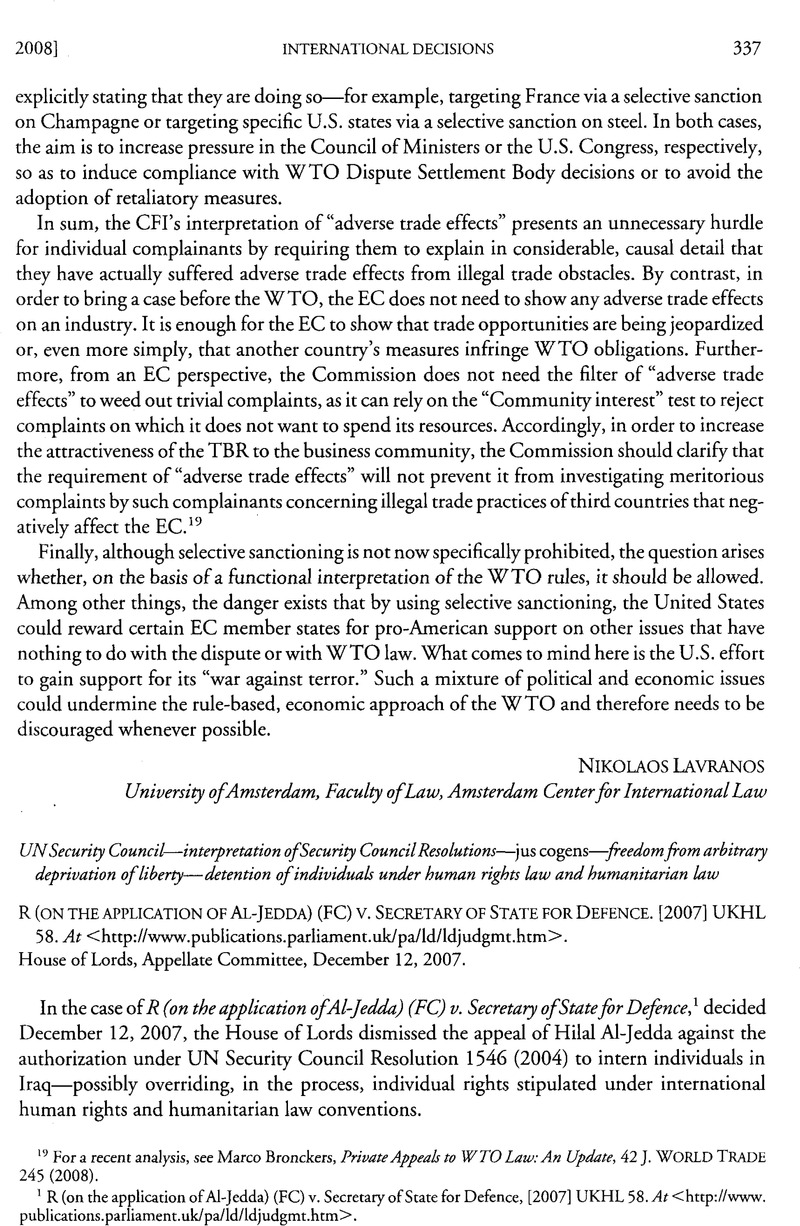Article contents
R (on the application of Al–Jedda) (FC) v. Secretary of State for Defence, [2007] UKHL 58
Published online by Cambridge University Press: 27 February 2017
Abstract

- Type
- International Decisions
- Information
- Copyright
- Copyright © American Society of International Law 2008
References
1 R (on the application of Al–Jedda) (FC) v. Secretary of State for Defence, [2007] UKHL 58. At <http://www.publications.parliament.uk/pa/ld/ldjudgmt.htm>.
2 Convention for the Protection of Human Rights and Fundamental Freedoms, Nov. 4, 1950, ETS No. 5, 213 UNTS 222, available at <http://www.echr.coe.int>.
3 Geneva Convention [No. 4] Relative to the Protection of Civilian Persons in Time of War, Aug. 12, 1949, 6 UST 3516, 75 UNTS 287.
4 R(on the application of Al–Jedda) v. Secretary of State for Defence, [2005] EWHC 1809 (Admin), paras. 128–40.
5 Id., para. 140.
6 R (on the application of Al–Jedda) v. Secretary of State of Defence, Court of Appeal, [2006] EWCA Civ 327, paras. 63, 75, 80 (Brook, L.J.).
7 See Article 4 of the Fourth Geneva Convention.
8 Behrami v. France, Joined App. Nos. 71412/01 & 78166/01, paras. 129–42 (Eur. Ct. H.R. May 2, 2007). See case report in this issue by Pierre Bodeau–Livinec, Gionata P. Buzzini, and Santiago Villalpando.
9 The same view was expressed by Baroness Hale of Richmond (para. 124) and by Lord Brown of Eaton–Under–Heywood (para. 148).
10 See, again, the opinion of Baroness Hale of Richmond (para. 124).
11 If so, however, then the United Nations itself had no effective control over the activities of the relevant troops either in Kosovo or in Iraq. In fact, even the existence of the ultimate control of the United Nations over the KFOR activities is something of a question. Both the Behrami decision (at para. 136) and Lord Rodger in the House of Lords’ Al–Jedda decision (at para. 102) acknowledged that the Security Council delegated the powers to KFOR and UNMIK without itself maintaining operational command over their operations.
12 Lord Rodger considered that the procedure of reporting and the conditions of terminating the mandate of the MNF further underlined the Security Council’s ultimate authority and control in that situation (para. 97).
13 Report of the International Law Commission on Its Fifty–sixth Session, UN GAOR, 59th Sess., Supp. No. 10, at 99, UN Doc. A/59/10 (2004); Second Report on Responsibility of International Organizations, UN Doc. A/CN.4/541 (2004). More specifically in terms of the UN–authorized operations, the Second Report goes on, “attribution of conduct should also in this regard be based on a factual criterion.” Id. at 20. The issue of attribution is thus purely factual and unrelated to the legal question of command and authority.
14 See Military and Paramilitary Activities in and Against Nicaragua (Nicar. v. U.S.), 1986 ICJ Rep. 14, paras. 105–12 (June 27); Application of the Convention on the Prevention and Punishment of the Crime of Genocide (Bosn. & Herz. v. Serb. & Mont.) (Int’l Ct. Justice Feb. 26, 2007). The same approach is taken in the ILC Articles on Responsibility of States for Internationally Wrongful Acts, in Report of the International Law Commission on the Work of Its Fifty–third Session, UN GAOR, 56th Sess., Supp. No. 10, at 43, UN Doc. A/56/10 (2001).
15 See Vienna Convention on the Law of Treaties, May 23, 1969, Art. 53, 1155 UNTS 331 Google Scholar.
16 On the interpretation of Security Council resolutions, see Alexander, Orakhelashvili, The Acts of the Security Council: Meaning and Standards of Review , 11 Max–Planck Y.B. United Nations L. 143 (2007)Google Scholar.
17 The United Kingdom is bound by international human rights law, particularly the European Convention on Human Rights, while conducting its operations in Iraq, as was affirmed in another House of Lords judgment, Al– Skeini v. Secretary of State for Defence , [2007] UKHL 26 (June 13, 2007)Google Scholar.
18 On the analysis and further references regarding the unambiguous recognition of the impact of jus cogens on Security Council resolutions, see Alexander, Orakhelashvili, The Post–war Settlement in Iraq: The UN Security Council Resolution 1483 (2003) and General International Law , 8 J. Conflict & Security L. 307 (2003)Google Scholar; Alexander, Orakhelashvili, The Impact of Peremptory Norms on Interpretation and Application of the UN Security Council Resolutions , 16 Eur. J. Int’l L. 59 (2005)Google Scholar; Alexander, Orakhelashvili, Peremptory Norms in International Law, chs. 12–14 (2006)Google Scholar.
19 Human Rights Committee, General Comment No. 29: States of Emergency (Article 4), para. 11, UN Doc. CCPR/C/21/Rev.l/Add.11 (2001).
20 In Prosecutor v. Tadić, Case No. IT–04–1–AR77, Allegations of Contempt Against Former Counsel, Milun Vijun (Feb. 27, 2001), the judgment of the appeals chamber of the International Criminal Tribunal for the Former Yugoslavia suggested that the procedural guarantees under Article 14 of the ICCPR reflect jus cogens. In Prosecutor v. Norman, Case No. SCSL–03–08–PT, Applications for a Stay of Proceedings and Denial of Right to Appeal, para. 19, the Special Court for Sierra Leone held that the right to have the criminal conviction against oneself reviewed by the higher tribunal, as enshrined in Article 14(5) of the ICCPR, is part of jus cogens.
21 Kadi v. Council, Case No. Case T–315/01, para. 287 (Eur. Ct. First Instance Sept. 21, 2005); Yusuf v. Council, Case T–306/01, para. 342 (Eur. Ct. First Instance September 21, 2005).
- 5
- Cited by




